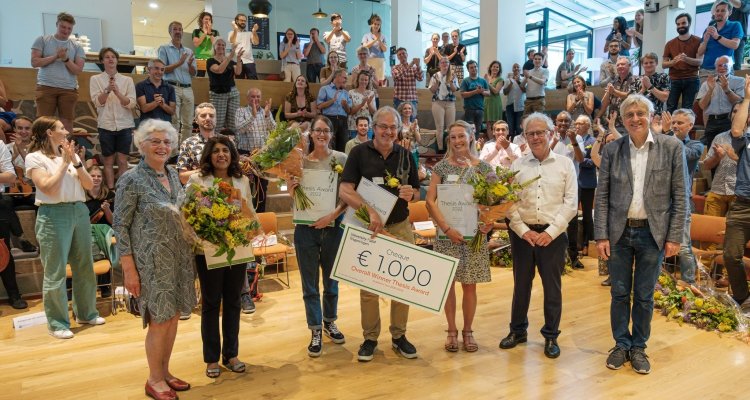Wageningen University & Research’s dogma-breaking photosynthesis research wins Thesis Award 2022
Four writers of excellent MSc theses won the Thesis Award 2022 from the University Fund Wageningen. Dana Verhoeven won in the field of life sciences with her thesis on light-capturing mechanisms during photosynthesis in plant leaves. She published her findings in an academic journal and even broke through an accepted dogma in plant physiology. For the plant physiologists among us: she showed that, contrary to previous belief, the membrane in which these photosystems reside undergoes no structural change during such a state transition. Her outstanding research and academic achievements led her to be crowned as the overall winner. Lisa Boterman, Max van Deursen and Aimee Kok wrote the best theses within the domains of environmental sciences, social sciences and agrotechnology and food sciences.
For her master’s thesis, Dana Verhoeven (MSc Molecular Life Sciences) aimed to better understand the mechanisms behind photosynthesis, a process in which plants turn the energy of the sun into sugars that nurture the plant. Understanding these mechanisms can help improve the photosynthetic efficiency in crops, so as to increase yield and meet the challenge of feeding the continuously growing world population.
An exceptional achievement
Dana wrote her thesis in the format of a scientific publication. In February this year, the publication, with Dana as first author, appeared in Plant Physiology, an acclaimed peer-reviewed journal in the field of Plant Sciences. This is an exceptional achievement, according to the jury: “It demonstrates that your research is widely appreciated in the field and that you had a key role in this achievement.” Dana was also lauded for her excellent experimental skills and enthusiasm. She will continue to work together with her thesis supervisor Emilie Wientjes as a PhD researcher.
Dividing light energy
To perform photosynthesis, plants have chloroplasts, unique organelles that capture sunlight via their light-harvesting systems, so-called photosystems. But the light conditions change as the sun moves across the horizon, the weather changes or the surroundings change. One way for plants to deal with the changing light conditions is to distribute the captured sunlight over two different photosystems in such a way that the performance of both is balanced. This is called ‘state transition’.
Dana developed a method that can measure the state transition in intact leaves (“in folio”) at a very high resolution. To do so, she used Fluorescence Lifetime Imaging, a microscopic method in which you look at how fast light emissions decrease in a fluorescent substance called fluorophore. With this method, you can show what happens inside the cell and even at the level of a single chloroplast. With her research, Dana has supplied a better understanding of how the light energy is divided between both photosystems and how the light harvesting capacity changes at the molecular level.
Award Ceremony
The prize was awarded during the Education Award Ceremony, an event celebrating several educational prizes: besides the Thesis Award, the Teacher of the Year Award and the Excellent Education Prizes were awarded as well. This year’s jury chairman was Prof.dr.ir. Francine Govers, Professor of Molecular Phytopathology at WUR.

